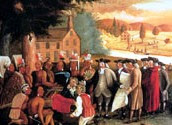By Rev. Abraham Keteltas (Oct. 5, 1777) - Posted at This Day in Presbyterian History:
Abraham Keteltas (1732-98) was raised by Protestant parents in New York and New Rochelle, where he spent much of his time among the communities of Huguenots in the area. Becoming fluent in French early on, he later studied theology at Yale, where he earned his degree in 1752, followed by gaining his preacher’s license in 1756. From 1757 until his dismissal in 1760, Keteltas supplied the pulpit of the Presbyterian church in Elizabethtown, New Jersey. He then served as an itinerant preacher to the Dutch and Huguenot parishes in Jamaica and Long Island, New York, where he gained much popular support. By 1776, Keteltas was elected to the Provincial Congress and became such a vociferous defender of the American cause that he feared for reprisals when British troops landed on Long Island. During the Revolution, he served as preacher to a number of Presbyterian churches in Massachusetts and Connecticut until his retirement in 1782. He died in 1798 and was buried on Long Island. (Source:http://digitalcommons.unl.edu/etas/30/)
An earlier sermon on patriotic themes was his 1759 The Religious Soldier, which was preached to both American and English soldiers, calling for ethical behavior among the military. A year after this sermon below, Keteltas also supported the Revolution with his Reflections on Extortion. Thus, he hardly shied away from political subjects.
Reiner Smolinksi summarizes that in this influential political sermon, Keteltas enlists Jehovah of Armies in defense of America’s rights. Drawing on typological parallels from both Testaments, Keteltas demonstrates that God always supports the cause of righteousness, liberty, and self-government, especially where his people are concerned. If God is on the side of his American Israel, Kelteltas prophecies, the British enemy cannot succeed for long. Religion and politics are joined in a bed of patriotism.”
Keteltas begins with an imprecation from Psalm 74:22, calling on God to arise and plead his own cause. His first primary point was “To shew you what we are to understand by the cause of God.” The preacher then set out to define the “cause of God,” which was “the whole system of divine truth.” In amplified form, the cause of God was:
All the doctrines contained in the old and new Testament, from that system of truth, of which we are speaking, amongst these doctrines, those most essential to man, are his fall in Adam, and redemption by the Lord Jesus Christ, the necessity of being regenerated and sanctified by the spirit of God, and being justified by the righteousness of his son imputed to them, and received by faith, the necessity of holiness in order to happiness, and of conformity in heart and life to the nature and will of God: These, and all the other doctrines of his word, are the cause of God.
However, Keteltas goes further to amplify: “But 2dly, By the cause of God, we are to understand, the cause of universal righteousness: The moral law, or the ten command-ments is the rule of this righteousness, and besides the moral law, all those duties which are incumbent upon us, as fallen creatures; such as the great duties of faith, repentance and conversion, which imply the forsaking of every sin, and the practice of every virtue.”
Thirdly, he added: “the welfare of the people, who believe and profess the above-mentioned system of divine truths, and practice the righteousness just now described, is the cause of God.”
